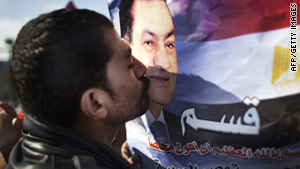LONDON – Egyptian authorities forced Vodafone to broadcast pro-government text messages during the protests that have rocked the country, the U.K.-based mobile company said Thursday.
Micro-blogging site Twitter has been buzzing with screen grabs from Vodafone's Egyptian customers showing text messages sent over the course of the demonstrations against Egyptian President Hosni Mubarak's 30-year-old regime.
A text message received Sunday by an Associated Press reporter in Egypt appealed to the country's "honest and loyal men to confront the traitors and criminals and protect our people and honor." Another urged Egyptians to attend a pro-Mubarak rally in Cairo on Wednesday. The first was marked as coming from "Vodafone." The other was signed: "Egypt Lovers."
In a statement, Vodafone Group PLC said that the messages had been drafted by Egyptian authorities and that it had no power to change them.
"Vodafone Group has protested to the authorities that the current situation regarding these messages is unacceptable," the statement said. "We have made clear that all messages should be transparent and clearly attributable to the originator."
The company also said its competitors — including Egypt's Mobinil and the United Arab Emirates' Etisalat — were doing the same. Etisalat, known formally as Emirates Telecommunications Corp., declined comment.
Vodafone said the texts had been sent "since the start of the protests," which kicked off more than a week ago. Vodafone did not immediately return an e-mail asking why the company waited nearly 10 days to complain publicly. Its statement was released only after repeated inquiries by the AP.
The company declined to reveal how many such messages it had sent, or whether it was still pumping them out.
Vodafone has already come under fire for its role in the Internet blackout that cut Egypt off from the online world for several days. The company said the order to pull the plug on its Egyptian customers could not be ignored as it was legal under local law.
Vodafone was able to restore its data services on Wednesday — five days after it suspended all services in the country, according to company spokesman Bobby Leach.
The company, however, was still unable to provide mobile phone text message services as of Thursday evening, he said.
Adam Schreck in Kabul contributed to this report.


